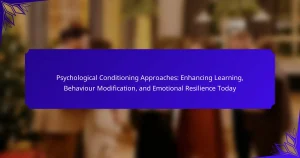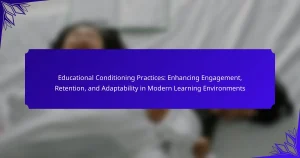Understanding moral development stages is crucial for fostering ethical growth in today’s society. This article explores the pre-conventional, conventional, and post-conventional stages of moral reasoning. It examines key attributes like cognitive development and social influences. Additionally, it highlights unique factors such as cultural diversity and technology’s impact on moral choices.
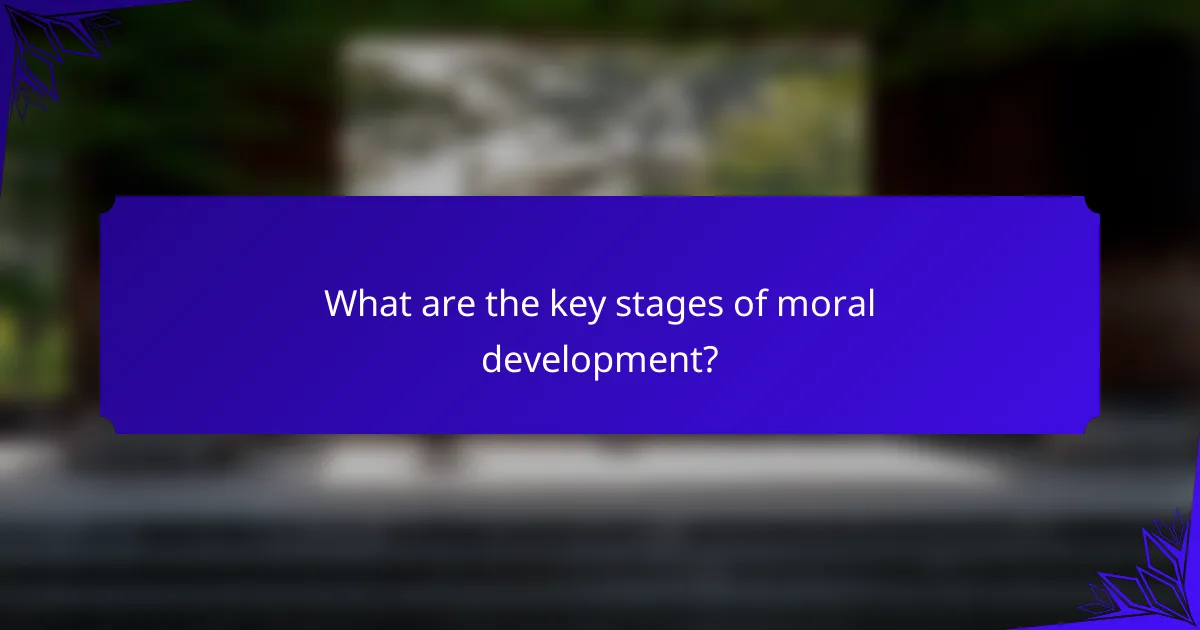
What are the key stages of moral development?
Moral development progresses through key stages that shape ethical reasoning. These stages include pre-conventional, conventional, and post-conventional levels, each marked by distinct characteristics and moral reasoning processes.
1. Pre-conventional: At this stage, individuals base their moral decisions on personal consequences. They seek to avoid punishment or gain rewards, focusing on self-interest.
2. Conventional: Here, individuals conform to societal norms and expectations. They prioritize maintaining relationships and upholding laws and rules, valuing group harmony.
3. Post-conventional: In this advanced stage, individuals recognize universal ethical principles. They may challenge societal norms for higher moral standards, emphasizing justice and individual rights.
Understanding these stages enhances awareness of ethical growth in today’s society.
How do learning theories explain moral growth?
Learning theories explain moral growth through structured stages, emphasizing the role of social interactions and conditioning. Key theories include Kohlberg’s stages of moral development, which outline progression from basic obedience to advanced ethical reasoning. Conditioning theories suggest that experiences shape moral understanding, reinforcing behaviors through rewards and consequences. Social learning theory highlights the influence of role models in moral development, illustrating how observation and imitation foster ethical growth. Together, these frameworks illustrate a comprehensive view of how individuals evolve morally within society.
What role does conditioning play in ethical decision-making?
Conditioning significantly influences ethical decision-making by shaping behaviors and responses. Through reinforcement and punishment, individuals learn which actions align with societal norms and moral values. This process enhances moral development, as conditioned behaviors become integrated into a person’s ethical framework. For example, positive reinforcement for altruistic actions encourages similar future behaviors, fostering ethical growth in society.

What are the universal attributes of moral development?
Moral development universally encompasses the progression through distinct stages, emphasizing ethical reasoning and social understanding. Key attributes include cognitive development, emotional growth, social influences, and the ability to empathize. These stages reflect how individuals learn moral principles, conditioned by societal norms and personal experiences. Understanding these attributes is essential for fostering ethical growth in today’s society.
How does age influence moral reasoning?
Age significantly influences moral reasoning, with younger individuals often relying on concrete rules while older individuals tend to adopt more abstract ethical principles. As people mature, they typically progress through various moral development stages, enhancing their ability to evaluate complex situations. Research indicates that this growth is linked to cognitive development, life experiences, and social interactions. For example, adolescents may struggle with moral dilemmas, while adults often demonstrate a more nuanced understanding of ethical issues. This evolution reflects a shift from a focus on personal consequences to a broader consideration of societal impacts.
What common values shape ethical growth in society?
Common values that shape ethical growth in society include integrity, empathy, justice, and respect. These values foster moral development by guiding individual behavior and societal norms. Integrity promotes honesty and accountability, while empathy encourages understanding and compassion towards others. Justice ensures fairness and equality, and respect nurtures acceptance and appreciation of diversity. Together, these values cultivate a supportive environment for ethical growth.

What unique factors affect moral development in modern contexts?
Unique factors affecting moral development in modern contexts include cultural diversity, technology influence, and social media dynamics. Cultural diversity introduces varying ethical perspectives, shaping moral reasoning. Technology, particularly artificial intelligence, challenges traditional moral frameworks, prompting new ethical considerations. Social media amplifies peer influence and moral discourse, impacting individual values and behaviors. These elements collectively redefine moral development stages in today’s society.
How do cultural differences impact moral reasoning?
Cultural differences significantly shape moral reasoning by influencing values, beliefs, and ethical perspectives. These variations affect how individuals interpret right and wrong based on their cultural backgrounds. For instance, collectivist cultures may prioritize group harmony over individual rights, while individualist cultures often emphasize personal freedom and autonomy. This divergence in moral frameworks can lead to contrasting ethical judgments in similar situations. As a result, understanding these cultural influences is crucial for fostering effective communication and collaboration in diverse societies.
What technological influences shape ethical perspectives today?
Technological influences today shape ethical perspectives through enhanced communication, data accessibility, and automation. The rapid spread of information via social media platforms fosters moral discussions and awareness. Advanced algorithms in AI challenge traditional ethical frameworks by introducing biases and accountability dilemmas. Additionally, the rise of digital privacy concerns prompts individuals to reassess their values regarding consent and transparency.

What rare attributes can be observed in moral development?
Rare attributes in moral development include the influence of cultural narratives, the role of empathy in ethical reasoning, and the impact of digital environments on moral choices. These aspects highlight how moral understanding evolves through unique societal contexts and personal experiences.
How do exceptional circumstances influence ethical growth?
Exceptional circumstances can catalyze ethical growth by challenging existing moral frameworks. These situations often prompt individuals to reassess their values and beliefs. For instance, crises can lead to a deeper understanding of empathy, as people confront the needs of others. This transformative process aligns with the unique attribute of moral development stages, where learning and conditioning play crucial roles. As a result, individuals may emerge with enhanced ethical perspectives, better equipped to navigate complex societal dilemmas.
What unique challenges do individuals face in moral reasoning?
Individuals face unique challenges in moral reasoning due to cognitive biases, social influences, and emotional factors. Cognitive biases can distort judgment, making it difficult to evaluate ethical dilemmas objectively. Social influences, such as peer pressure, can lead individuals to conform to group norms rather than adhere to personal ethical beliefs. Emotional factors, like fear or guilt, may cloud decision-making processes, complicating moral reasoning. These challenges can hinder ethical growth, making it essential to develop awareness and critical thinking skills to navigate moral complexities effectively.
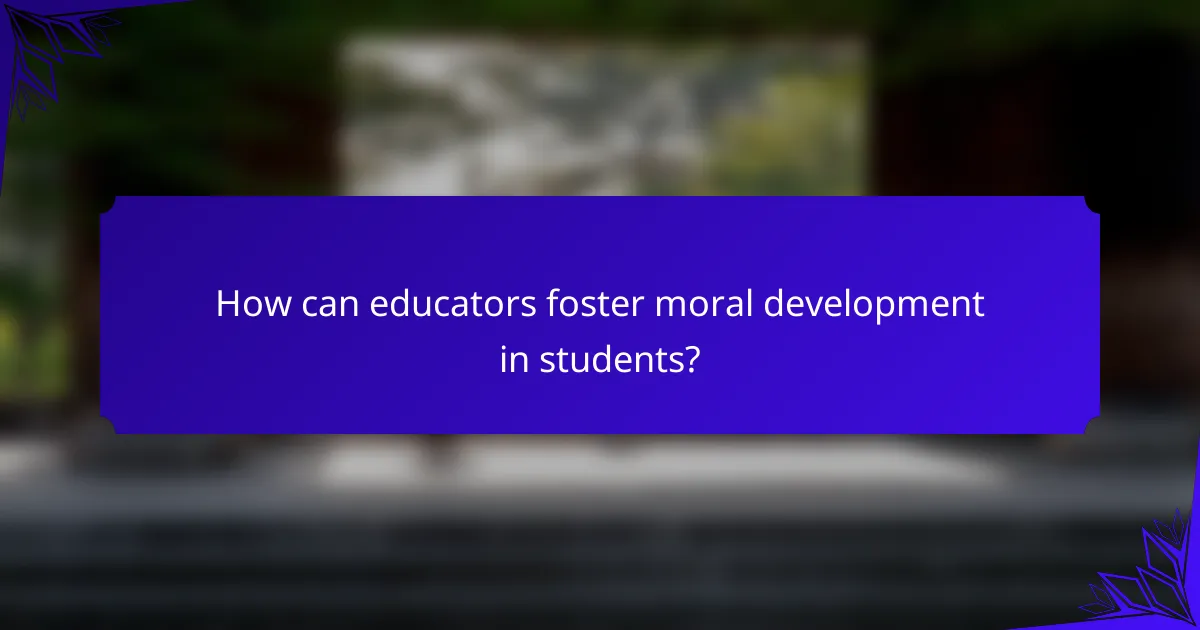
How can educators foster moral development in students?
Educators can foster moral development in students through intentional teaching strategies. Engaging students in discussions about ethical dilemmas enhances critical thinking and empathy.
Role-playing scenarios allows students to explore moral choices and consequences. Providing a safe environment for open dialogue encourages students to express their thoughts on right and wrong.
Integrating community service projects cultivates social responsibility and reinforces the importance of altruism. Educators should model ethical behavior, as students often emulate adult actions.
Lastly, incorporating literature that addresses moral themes can stimulate reflection and moral reasoning. These approaches collectively support students’ ethical growth in today’s society.
What strategies can be employed to enhance ethical reasoning?
To enhance ethical reasoning, individuals can employ strategies such as critical thinking, empathy development, and exposure to diverse perspectives. Engaging in discussions that challenge personal beliefs fosters moral growth. Practicing ethical dilemmas through role-playing scenarios deepens understanding of consequences. Regular reflection on personal values strengthens ethical frameworks.
How can role-playing scenarios aid moral understanding?
Role-playing scenarios significantly enhance moral understanding by immersing individuals in complex ethical situations. They promote empathy and perspective-taking, allowing participants to experience diverse viewpoints. This experiential learning fosters deeper cognitive engagement, facilitating the transition through moral development stages. As a result, individuals can better navigate real-world ethical dilemmas, cultivating a more nuanced moral compass.
What are effective discussion techniques for moral dilemmas?
Effective discussion techniques for moral dilemmas include open-ended questioning, active listening, and fostering a safe environment. These strategies encourage participants to express their views and explore ethical complexities. Open-ended questions stimulate deeper thinking and reflection, while active listening ensures all voices are heard. Creating a safe environment allows participants to share without fear of judgment, enhancing engagement and understanding. As a result, these techniques promote ethical growth and moral development in discussions.
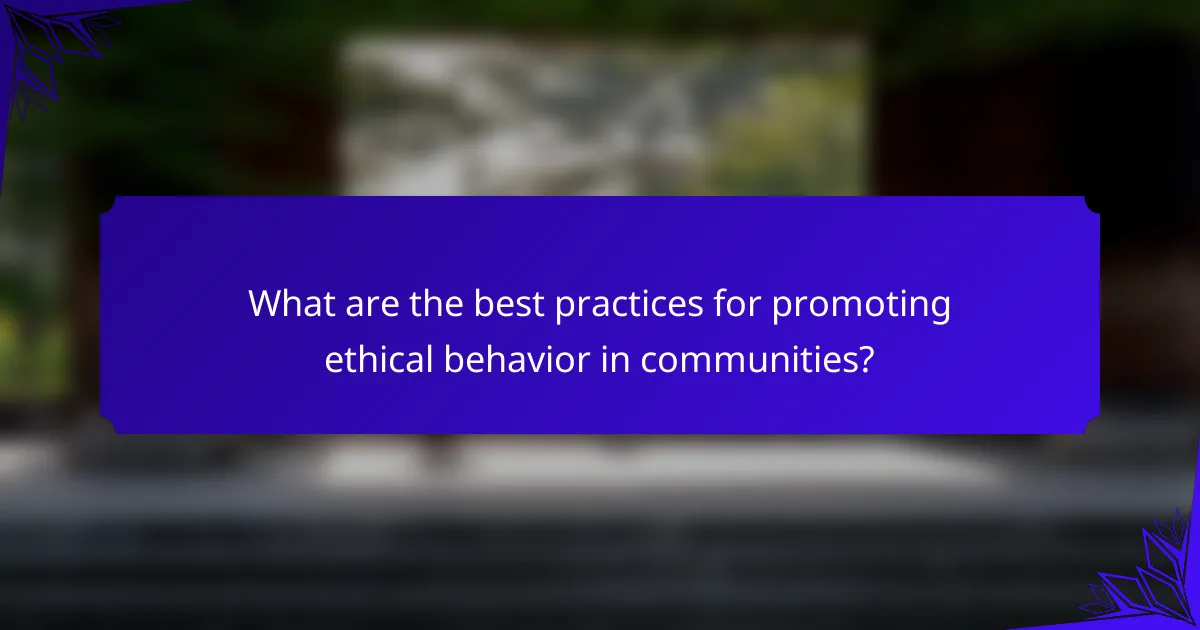
What are the best practices for promoting ethical behavior in communities?
Promoting ethical behavior in communities involves fostering moral development through education and positive reinforcement. Key practices include encouraging open dialogue, modeling ethical behavior, and creating supportive environments.
Engagement in community activities enhances social responsibility, while educational programs focused on ethics can deepen understanding of moral development stages. For example, workshops on ethical decision-making can significantly impact community members’ growth.
As a result, communities that prioritize ethical behavior experience increased trust and cooperation among members, leading to a more harmonious society. Regular assessment of community values and behaviors can further reinforce these practices, ensuring ongoing ethical growth.
How can awareness campaigns influence moral development?
Awareness campaigns can significantly influence moral development by promoting ethical behaviors and social responsibility. These campaigns often utilize educational strategies to shape values and encourage positive decision-making.
Research indicates that exposure to awareness campaigns can enhance moral reasoning, particularly among youth. For example, campaigns addressing environmental issues foster a sense of stewardship and responsibility. As a result, individuals are more likely to engage in ethical behaviors aligned with societal values.
Furthermore, the unique attribute of these campaigns lies in their ability to create a shared moral narrative that resonates across diverse communities. This collective understanding can lead to sustained changes in individual and group behaviors, reinforcing ethical growth in society.
In conclusion, awareness campaigns serve as powerful tools for moral development by instilling values, enhancing ethical reasoning, and fostering a sense of community responsibility.
What common mistakes should be avoided in ethical education?
To avoid common mistakes in ethical education, focus on fostering critical thinking and open dialogue. One mistake is neglecting diverse perspectives, which can limit moral understanding. Another is relying solely on theoretical frameworks without practical application, hindering real-world ethical growth. Additionally, failing to assess students’ moral reasoning stages can lead to ineffective teaching methods. Lastly, overlooking the importance of emotional intelligence may diminish the impact of ethical lessons.
How can individuals apply moral reasoning in everyday life?
Individuals can apply moral reasoning in everyday life by evaluating situations through ethical frameworks. This process involves recognizing moral dilemmas, considering the impact of actions, and making decisions aligned with personal values and societal norms.
Moral development stages influence how individuals interpret ethical issues. For instance, early stages may focus on obedience and punishment, while advanced stages emphasize universal ethical principles. Individuals can enhance their moral reasoning by reflecting on past decisions, engaging in discussions, and seeking diverse perspectives.
Practical applications include assessing the consequences of actions in personal relationships and community involvement. By prioritizing empathy and fairness, individuals can foster ethical growth and contribute positively to society.
In summary, consistent practice of moral reasoning in daily interactions strengthens ethical decision-making and promotes personal and collective well-being.
What expert insights can enhance understanding of moral development?
Expert insights into moral development emphasize the significance of learning, conditioning, and ethical growth. Understanding these elements can enhance awareness of how individuals navigate moral dilemmas.
Research indicates that moral development occurs in stages, influenced by cognitive and emotional factors. For instance, Kohlberg’s stages illustrate how reasoning evolves from basic obedience to complex ethical principles.
Conditioning plays a crucial role in shaping moral behavior. Positive reinforcement can encourage ethical actions, while negative experiences may deter unethical choices.
In today’s society, exposure to diverse perspectives fosters moral reasoning. Engaging with various cultural and ethical viewpoints can deepen understanding and promote empathy.

